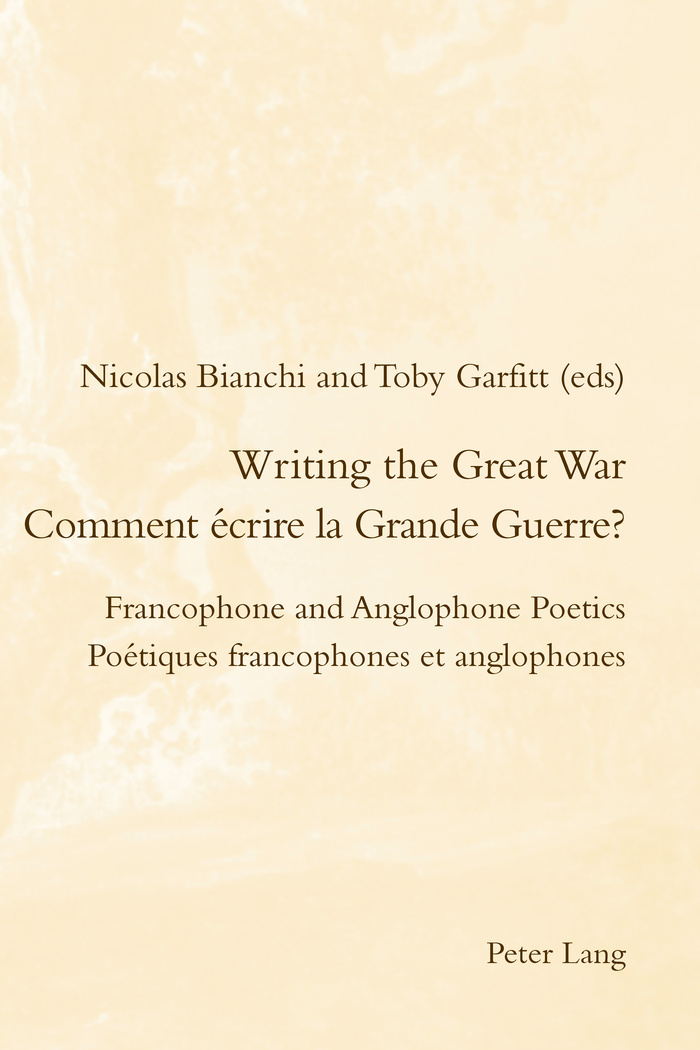
N. Bianchi, T. Garfitt (dir.), Comment écrire la Grande Guerre ? Poétiques francophones et anglophones
Référence bibliographique : Nicolas Bianchi et Toby Garfitt (dir.), Comment écrire la Grande Guerre ? Poétiques francophones et anglophones, Peter Lang, collection "Romanticism and after in France / Le Romantisme et après en France, Vol. 27Series Editor: Patrick McGuinness", 2017. EAN13 : 9781787071988.
Francophone and Anglophone Poetics
Comment écrire la Grande Guerre?
Poétiques francophones et anglophones
Edited by Nicolas Bianchi and Toby Garfitt
Oxford, 2017. XIV, 366 pp.
Available in ePDF and ePUB formats
For France the First World War, or Great War, was a war of national self-defence, but for Britain it was not. Does that mean that French literary treatments of this unimaginably destructive war were very different from British ones? Not necessarily ? but much can be learned from considering both traditions side by side, something that is rarely done.
The essays collected in this bilingual volume, by a range of scholars working on literature and history on both sides of the Channel, show that while the wider purposes of the war are striking for their absence in both French and British traditions, there are many common strands: realistic narratives of the trenches, humour as a safety-valve, imagination and creativity. Yet there are differences, too: for instance, there is plenty of French poetry about the war, but no real equivalent of the British «war poets». The volume looks at iconic figures like Owen, Brooke, Barbusse, Apollinaire and Proust, but also at a number of lesser known writers, and includes a study of «poetry of colour», recognising the active contribution of some four million non-Europeans to the war effort. The book includes a preface by the eminent war historian Sir Hew Strachan.
*
Engagée dans une guerre défensive sur ses frontières, la France connut une Grande Guerre bien différente de celle avec laquelle composèrent ses alliés britanniques. Faut-il en conclure que les deux nations furent amenées à produire des réponses au conflit radicalement différentes ? Peut-on dégager des traditions nationales ou des tendances transnationales ouvrant la voie à des comparaisons encore rarement esquissées par la critique littéraire ? C’est le pari des contributions de ce volume bilingue, réunissant autour de la question : « comment écrire la Grande Guerre ?», les articles de spécialistes francophones et anglophones des domaines historique et littéraire. Il montre la variété des thématiques partagées par les deux traditions littéraires : récits réalistes des tranchées, usage de l’humour comme d’un exutoire salutaire, imagination et créativité ; et souligne la présence de différences notables, comme l’absence de mythification en France de la poésie de 14, pourtant elle-aussi produite en masse tout au long de la guerre. L’ouvrage, tout en donnant une place de choix aux écrivains de premier ordre (Owen, Brooke, Barbusse, Apollinaire ou Proust), tente d’offrir quelque visibilité à un certain nombre d’auteurs moins connus, au nombre desquels des auteurs de couleur, à qui leur contribution à l’effort de guerre n’aura pas valu la reconnaissance littéraire attendue. La préface a été rédigée par Sir Hew Strachan, grand spécialiste de l’histoire de la période.
*
Sommaire
Foreword, Hew Strachan (University of St Andrews)
Introduction, « Deux champs littéraires dans la tourmente de 14-18, Nicolas Bianchi
Part 1: Poetry of memory, memory of poetry
Toby Garfitt (University of Oxford, Magdalen College) « Poetry of Colour »
Alisa Miller (Norwich University of the Arts), « England and France in the First World War: Translating the myth of the poet soldier »
Ashley Somogyi (Durham University), « ‘That Other Life’: Poetic Exploration of Responses to the Dichotomy of War and Home in First World War Poetry »
Partie 2 : La prose des poètes de la Grande Guerre, laboratoire littéraire
Laurence Campa (Université Paris Ouest-Nanterre), « Légendes de Jacques Vaché »
Philippe Wahl (Université Lyon 2), « Apollinaire soldat ou l’Aventure. Variations génériques et discursives »
Jane Potter (Oxford Brookes University), « 'I can find no word to qualify my experiences except the word sheer: Wilfred Owen's Letters and his Baptisms of Fire »
Part 3: Rethinking the styles of war: A poetics of interference?
Flavie Fouchard (Universidad de Sevilla), « Échos de la Grande Guerre. La prolifération des voix dans Gaspard, Le Feu, Les Croix de bois et Clavel Soldat »
Troels Hugues Hansen (University of Copenhagen), « The Great War and Celinian poetics »
Sarah Montin (Université Paris III Sorbonne Nouvelle), « ‘’Spirit above wars’’ : fonctions du light verse dans la poésie britannique de la Première Guerre mondiale »
Partie 4 : Esthétique et lectures politiques
Camille Kerbaol (Université de Bretagne Occidentale), « Clavel Soldat ou l’impossibilité d’écrire la guerre quand on est socialiste »
Frédéric Saenen (Université de Liège), « 1914 au miroir de 1941 : Drieu correcteur d’Interrogation et de Fond de cantine »
Pascal Ifri (Washington University in St. Louis), « World War I as seen by Proust, Céline and Jean Renoir in their works and personal writings »
Part 5: Representation of male characters
Nicolas Bianchi (ENS Lyon-MFO), « Loustics, balourds et picaros. Regards sur le personnage comique romanesque de 14-18 »
Margaux Whiskin (University of Warwick), « Caricature of a British gentleman, portrait of a French soldier: humour and nationality in André Maurois’ Les Silences du colonel Bramble »
Pierre Vaucher (Université Laval / Ghent University), « Entre ironie et hommage aux victimes de la guerre : Civilisation de Georges Duhamel »
Nancy Martin (University of Oxford, Linacre College), « ‘[I am] unable to refuse the call of these pages to be scribbled in’: First World War combatant testimony and the navigation, narration, and maintenance of self. »
Conclusion, Toby Garfitt
Nicolas Bianchi is a Normalien and Agrégé de Lettres Modernes, teaching at Université Montpellier III.
Toby Garfitt is Fellow and Tutor in French at Magdalen College, Oxford.
Available for purchase here: https://www.peterlang.com/view/product/79263